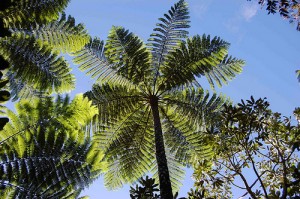Print  |
|


On the endangered Kanak languages
Posted by Fabrice Wacalie on November 19, 2011
Fabrice Wacalie, PhD in Oceanic linguistics, has been working on the preservation of Kanak languages of the New Caledonian far South since 2007.

Nouvelle-Calédonie
In Melanesia, traditionally, linguistic diversity is the rule, while monolingualism is the exception. New Caledonia is home to no less than twenty-eight Kanak languages, eleven dialects, and one Creole, adding up to a mere total of 75,411 speakers. Yet most of the Kanak languages are endangered nowadays.
Factors of the erosion
In the mid-19th century, during the last decade prior to colonization, the number of Kanak language speakers dropped – partly because of the tribal wars raging at the time, but also because of the epidemics that followed first encounters with the colonists.
Then significant population movements were generatedas the colonial administration established its capital in Nouméa, shattering traditional Kanak linguistic areas (except that of NââKwényï, which was relatively isolated). When the colonists settled in the city, the clans who lived there were despoiled of their land and pushed away. Some clans went south, others north. Thus the current languages originate in the blend of several others.
The spread of Christianity in the language of the colonists brought the abandonment process of Kanak languages even further. Missionaries banned their usage within the missions. Learners were punished if they spoke in Kanak language, to the extent that a certain number of”traumatized” grandparents still forbid themselves from speaking their own language today. This created a rupture in the dynamic of intergenerational transmission.
The case of Yaté, in the South.
“When the children hear me speak the language, they laugh and say: Wawa (grandma), your English is good!” reports mamieWaiju resignedly, who speaks NââNumèè and lives in the far South of New Caledonia.
And indeed children and youngsters no longer speak Kanak languages in this part of the country because their parents give priority to French. They consider French more important for succeeding in school. Actually, there are none but one Kanak language class in Yaté, plus a few other institutional and associative initiatives that involve Kanak languages in extra-curricular activities.
Seniors and some parents still speak these languages on a daily basis. In custom ceremonies, however, French is gradually taking over.
Players of preservation in the Drubea-Kapume area.
Mining operator “Vale Nouvelle-Calédonie”, a mining company that extracts nickel and cobalt, has granted significant financial resources to a Kanak language development program in southern New Caledonia (NââNumèè, NââDrubéa, and NââKwênyii, spoken on the Isle of Pines):
I work for this program, which consists in elaborating educational tools aiming to support the teaching of these languages in schools and homes.
Between 2008 and 2010 we carried out up to 300 interviews with over 100 resource-people including speakers, school teachers, researchers, illustrators, experts, etc. The data collected was used in crafting educational games to hand down to the children the language of their elders. Five posters themed around plants and animals were created in south Kanak language. Five memory games, five picture books, and a species game were also designed. These were handed out in schools and homes for free.
Partnerships with other cultural players have also been set in motion: the publication of a traditional tale in NââNumèè language, for instance, which is in project with the Kanak Culture Development Agency, should see the light in the fall of 2012.
The Kanak Language Academy (ALK) is also part of the process; they have been contributing to the codification and standardization of these languages since 2008. A close collaboration between the Vale program and the ALK helps us create educational tools that are consistent with the institution’s standards.
An agreement has also signed with Saint-Joseph de Vaojunior high in 2009 to support the teaching ofNââKwényï in this school located on the Isle of Pines. The funds invested were used to pay the two teachers who delivered courses in Kwényï language.
Finally, a series of lectures and discussions was organized in 2009 when Tokyo University-based Japanese linguist TadahikoShintani, the only expert onNââDrubéa, visited New Caledonia.
With that in mind, and beyond efforts by institutions or local players, the survival of these languages, a whole part of Human heritage, now depends on the speakers’ actual will to keep speaking them.








